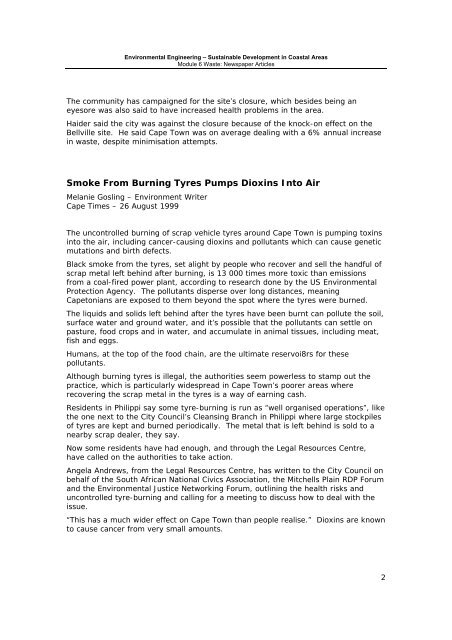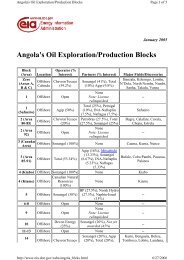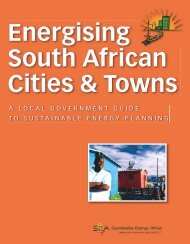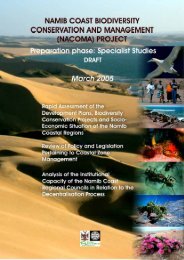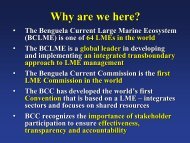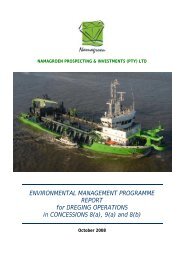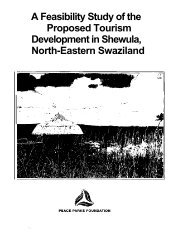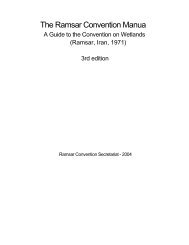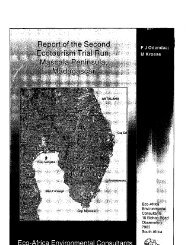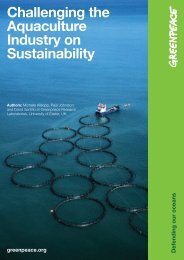Waste: Newspaper Articles
Waste: Newspaper Articles
Waste: Newspaper Articles
You also want an ePaper? Increase the reach of your titles
YUMPU automatically turns print PDFs into web optimized ePapers that Google loves.
Environmental Engineering – Sustainable Development in Coastal Areas<br />
Module 6 <strong>Waste</strong>: <strong>Newspaper</strong> <strong>Articles</strong><br />
The community has campaigned for the site’s closure, which besides being an<br />
eyesore was also said to have increased health problems in the area.<br />
Haider said the city was against the closure because of the knock-on effect on the<br />
Bellville site. He said Cape Town was on average dealing with a 6% annual increase<br />
in waste, despite minimisation attempts.<br />
Smoke From Burning Tyres Pumps Dioxins Into Air<br />
Melanie Gosling – Environment Writer<br />
Cape Times – 26 August 1999<br />
The uncontrolled burning of scrap vehicle tyres around Cape Town is pumping toxins<br />
into the air, including cancer-causing dioxins and pollutants which can cause genetic<br />
mutations and birth defects.<br />
Black smoke from the tyres, set alight by people who recover and sell the handful of<br />
scrap metal left behind after burning, is 13 000 times more toxic than emissions<br />
from a coal-fired power plant, according to research done by the US Environmental<br />
Protection Agency. The pollutants disperse over long distances, meaning<br />
Capetonians are exposed to them beyond the spot where the tyres were burned.<br />
The liquids and solids left behind after the tyres have been burnt can pollute the soil,<br />
surface water and ground water, and it’s possible that the pollutants can settle on<br />
pasture, food crops and in water, and accumulate in animal tissues, including meat,<br />
fish and eggs.<br />
Humans, at the top of the food chain, are the ultimate reservoi8rs for these<br />
pollutants.<br />
Although burning tyres is illegal, the authorities seem powerless to stamp out the<br />
practice, which is particularly widespread in Cape Town’s poorer areas where<br />
recovering the scrap metal in the tyres is a way of earning cash.<br />
Residents in Philippi say some tyre-burning is run as “well organised operations”, like<br />
the one next to the City Council’s Cleansing Branch in Philippi where large stockpiles<br />
of tyres are kept and burned periodically. The metal that is left behind is sold to a<br />
nearby scrap dealer, they say.<br />
Now some residents have had enough, and through the Legal Resources Centre,<br />
have called on the authorities to take action.<br />
Angela Andrews, from the Legal Resources Centre, has written to the City Council on<br />
behalf of the South African National Civics Association, the Mitchells Plain RDP Forum<br />
and the Environmental Justice Networking Forum, outlining the health risks and<br />
uncontrolled tyre-burning and calling for a meeting to discuss how to deal with the<br />
issue.<br />
“This has a much wider effect on Cape Town than people realise.” Dioxins are known<br />
to cause cancer from very small amounts.<br />
2


